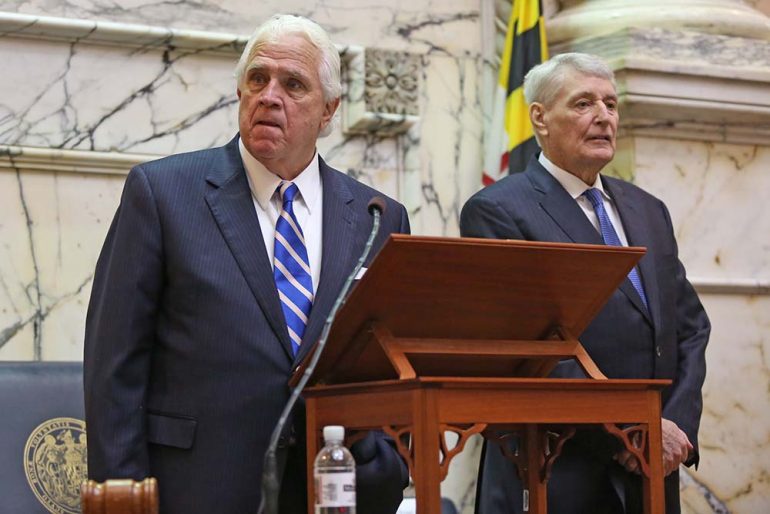ANNAPOLIS, Maryland – The state Senate voted Thursday morning to override Gov. Larry Hogan’s 2016 veto of the Clean Energy Jobs bill, 32 to 13, after the House voted 85 to 51 Tuesday to override the measure.
This law, dubbed the “Sunshine Tax” by Hogan, will change the requirement for renewable-energy sources in Maryland’s electricity supply from 20 percent by the year 2022 to 25 percent by the year 2020.
“This legislation is a tax increase that will be levied upon every single electricity ratepayer in Maryland and, for that reason alone, I cannot allow it to become law,” Hogan said in a veto letter to Senate President Thomas V. “Mike” Miller Jr. on May 27.
The governor wrote that the percentage increase is laudable, but increasing taxes is not the correct approach.
Multiple environmental groups in the region have supported the legislation, saying it would help the environment and the economy.
James McGarry, Maryland and Washington, D.C., policy director for Chesapeake Climate Action Network, said to call the bill a tax is a misnomer, saying it is rather a requirement that the state should uphold.
“With the override, Maryland will increase its commitment to clean energy,” McGarry told the University of Maryland’s Capital News Service. “It will not only stimulate energy, but also create jobs and have enormous health benefits.”
“There is support across party lines, rural, suburban areas,” McGarry said. “It’s clear this isn’t a partisan issue.”
Delegate Kathy Szeliga, R-Harford and Baltimore counties, said in a press release this bill will cause Marylanders’ electric bills to increase.
“Working families and retirees cannot afford to foot the bill for the lofty goals of the Democrats in Annapolis,” Szeliga wrote in the release. “This is one more reason for grandma and grandpa to move to Florida and have more than enough savings to fly up to Maryland to visit the grandkids.”
A Department of Legislative Services 2016 fiscal analysis of the bill, the state anticipates an “increase of between $0.08 (per megawatt-hour) to $0.32 (per megawatt-hour) in 2017,” where the average residential customer uses about one megawatt-hour per month.
“Poll after poll, Marylanders are willing to invest in the future of clean energy,” said Karla Raettig, executive director of the Maryland League of Conservation Voters. Raettig called the bill a job creator with benefits to the environment and the economy.
Sen. Brian Feldman, D-Montgomery, referenced a 2017 U.S. Energy and Employment Report that states there are 7,279 solar jobs in Maryland.
Maryland saw a 42 percent increase in solar jobs in the past year and could see about a thousand new solar jobs each year going forward, according to Feldman. He said the jobs created are high-paying jobs that don’t require a college degree.
Sen. James Rosapepe, D-Prince George’s and Anne Arundel, called the jobs produced from collecting renewable energy the “blue collar jobs of the 21st century.” He compared oil in Texas and coal in West Virginia to renewable energy in Maryland.
Sen. Stephen Hershey, R-Caroline, Cecil, Kent and Queen Anne’s, said placing the burden on ratepayers is not the right way to accomplish Maryland’s renewable energy goal.
“It’s just not the right program,” Hershey said Thursday on the Senate floor. “It’s not the right program for Marylanders and not a program that warrants increased compliance.”
Miller said the override of the governor’s veto shows that the environment is very important to Maryland and the legislation is moving the state in a progressive direction.
After both chambers’ votes, the bill will become law in 30 days.
During Thursday’s session, the Senate also voted against the override of Senate bill 910, a bill that would establish a Maryland Education Development Collaborative, 0 to 45. Sen. Bill Ferguson, D-Baltimore, encouraged the Senate to vote against the override, saying he plans to write a new bill.
The Senate approved to move the readings of Senate bill 540, which would regulate Morgan State University housing, to Mar. 7 and Senate bill 907, which would require the state and the Maryland Transportation Authority to finance a replacement for the Harry W. Nice Memorial Potomac River Bridge, to the 87th day of session.

